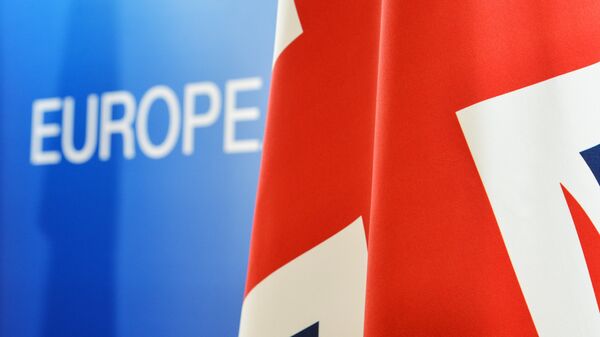According to the study, which was based on data produced by Eurostat and the Organisation for Economic Co-operation and Development, the number of Britons emigrating to EU countries rose by 30 percent from 2016 to 2018.
From 2008 to 2015, nearly 57,000 UK citizens moved annually to any of the other EU countries. This number climbed to 73,642 per year from 2016 to 2018 following the referendum, the researchers said.
Additionally, a five-fold increase in UK nationals receiving citizenship in an EU country was registered in the two years after the 2016 vote. In Germany, this figure rose by 2,000 percent, according to the study.
Traditional migration trends have seen a large number of elderly UK citizens retire to Spain and France, taking advantage of the warm climate, and according to the new study, the largest rise in the arrival of UK nationals was registered in these two countries.
However, the rise in out-migration to Germany and the staggering increase in the number of UK nationals receiving citizenship in the largest EU economy led the researchers to warn of a potential brain drain, citing the growth in highly educated Britons choosing to move abroad.
"These increases in numbers are of a magnitude that you would expect when a country is hit by a major economic or political crisis", Daniel Auer, a researcher at the Berlin Social Science Centre, said in a press release.
Researchers also noted that there was a significant increase in the number of UK citizens who said they were taking a risk by moving abroad and a rise in those who were willing to take a pay cut in order to move to an EU country, potentially signifying shifting migration trends in the post-Brexit era.
Britons Continue to Move to Spain, France
An estimated 400,000 UK citizens live in Spain, which has traditionally been the most popular tourist destination for Britons. Securing the rights of these citizens, as well as the more than 3 million EU nationals currently living in the UK, has been one of the most crucial themes during the ongoing negotiations between London and Brussels as the Brexit transition period draws to a close on 31 December.
John Phillips, an 83-year-old UK ex-pat based in Spain's Alicante region, said that living abroad has multiple health benefits and cited the large community of Britons based on the Spanish coast.
"My wife and I have decided years ago to move to Spain; since I retired actually. I am here to warm my old bones! The weather is better for my arthritis and we don’t feel isolated at all. We have many friends and neighbors who are British; there are plenty of pubs and Indian restaurants everywhere. This feels like Britain with the sun", Phillips remarked.
Providing health care for the large number of elderly UK citizens currently based abroad has been a major subject of discussions. Prior to Brexit, UK citizens could hold a European Health Insurance Card (EHIC), which gave them the right to receive medical treatment in any other EU country, as well as Switzerland, Norway, Iceland, and Liechtenstein.
Should the Brexit transition period end without an agreement on the future of the EHIC, UK citizens could face hefty medical bills abroad. A subsequent rise in the cost of travel insurance policies may also be on the horizon.
For Peter Harris, a 42-year-old IT professional who recently purchased a home in the southwestern French town of Monsac, the uncertainty caused by the Brexit process has not curtailed his desire to spend time in the UK’s southerly neighbour.
"We might retire here when the time comes, but it is still very far off. For the moment we are really happy with our decision and Brexit does not change anything. Whatever the political evolution of our democracies, we’ll remain good friends and partners in business. We don’t envisage changing nationality, but it might be an option when we retire", Harris stated, adding that his job allows for remote working that can be conducted in both the UK and France.
A love of French culture also motivated the IT professional to purchase a home in France and establish roots in the EU country.
"This has been our dream for a long time. I am in love with the French way of life, and the incredible food quality in this region", Harris commented.
According to Gilles Lebreton, a French member of the European Parliament, France will always open its doors to working migrants who are able to integrate into society.
"British citizens have always been welcome. This kind of immigration does not create any problems. Retirees who buy the house they dream of in the ‘douce France’ [sweet France], entrepreneurs or businesspersons who have developed their activity on this side of the Channel, people who have come through marriages, the reasons are many, and these people usually have a very good level of education and revenue, which means that they integrate perfectly and all European countries are welcoming them", the lawmaker added.
Changing Realities as Brexit Panic Fades
While the researchers of the joint UK-German study stated that the out-migration practices of UK citizens are indicative of an economic shock, particularly after the 2016 vote, Lebreton asserted that the situation has stabilised since Prime Minister Boris Johnson took office in 2019, giving clarity and certainty to the Brexit process.
"The British press and the European subsidised press have been manipulated for the last few years into creating panic because of Brexit. Now that Brexit is decided and will be a reality on January 1, 2021, this artificial panic does not exist anymore. Now that Boris Johnson has set the course, all the hoopla and panic has disappeared", the French member of the European Parliament said.
Francis Cole, a UK citizen who formerly worked as a civil servant for the European Union, said that Brexit will change little.
"We are a stone's throw away from Britain, either by ferry or via the Channel Tunnel, so what is the problem? We can visit family whenever we want, EU or not", Cole commented.
Now living in the small Belgian village of La Bruyere, near Namur, Cole said that he purchased a home in Belgium and plans to spend his retirement there.
"I made my whole career as an international civil servant at the European Commission, working in Brussels, Luxembourg, and Strasbourg; we had our children here, they are bilingual, we have bought a house here and we have always thought that we would retire here", the former EU civil servant remarked.
Commenting on the issue of UK nationals choosing to receive citizenship of an EU country, Cole said that this should not create major issues.
"I don’t see any of my British friends here on the continent having any serious problems remaining British citizens. There will be some formalities to remain, but nothing insurmountable and they will still need to pay their taxes in the UK. Some prefer to take Belgian nationality or another one for more convenience, for the education system or a smooth use of the health facilities in Belgium, but it is not a ‘do or die’ issue. Far from it", Cole stated.
Despite working for the European Union, the former civil servant said that he supported Brexit, particularly as it will help the UK negotiate better trade agreements for itself, which may lead to sustained economic growth.
"I am all for Brexit. I am sure Britain will be better off on its own, negotiating its commercial policies with the world … and the EU of course, as was the case in the days of the European Free Trade Area and before joining the EU", the former civil servant said.
The United Kingdom officially left the European Union on 31 January, completing a three-and-a-half-year process that began with the 2016 referendum.
Negotiators from London and Brussels have so far held six rounds of talks on the future relationship between the UK and the EU, although both sides have criticised one another for the lack of progress made to date.
Both the UK and the EU have expressed a desire to avoid a no-deal Brexit, but as the deadline date moves ever closer, it remains to be seen if the required agreements will be reached.




